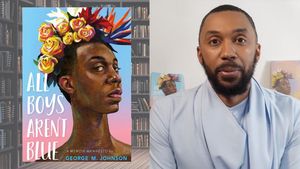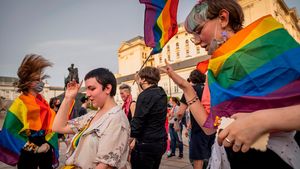In September, 25-year old Shokir Shavkatov had just come out over Instagram. In many countries that is the new normal, a quick and easy way to let friends and family know and to then move on with your life. But in Uzbekistan, where homosexuality is a crime, it was brave and daring, pushing the lines of how gay people in Uzbekistan can live and demanding the sort of dignity he knew that gay people had elsewhere. But just days later, he was dead.
The night before his murder, Shokir went to a club in the Uzbek capital. A friend said he saw two men in their 40s accost Shokir, identifying themselves only as the "morality police." Hours later he was found in an apartment covered in stab wounds, with his throat cut so deeply he was nearly decapitated.
Uzbek police arrested a man and claimed that Shokir had been murdered by his lover. But no one in the LGBTQ+ community in Uzbekistan believed it. In a country where the police use fake profiles on social media to lure gay men to apartments and then make them choose between paying up or facing three years in prison, how can they?
This is the reality in Uzbekistan, where I, like Shokir, was born; it's one of only two post-Soviet states that still criminalize homosexuality. The second country is Turkmenistan, where these stories are also familiar. There, a gay cardiologist named Kasymberdy Garayev, who came out online like Shokir, disappeared recently after being summoned to a police station for questioning.
In my home country, there is hope for change. In the face of an economic crisis, it has eased visa restrictions in recent years, encouraged Western investment, and even allowed human rights organizations back into the country. But even as Uzbekistan embraces the West, progress has remained limited for LGBTQ+ people. When the country prepared to implement United Nations human rights recommendations in 2018, Uzbek officials said one issue was off the table: LGBTQ+ rights. The reason they gave? That homosexuality is "irrelevant" to Uzbek society.
To be honest, I don't know what that means. I think it means they think people like Shokir and me don't exist. It is an amazing thing to claim when there has been a wave of arrests of gay Uzbeks in recent months. Just days before Shokir went to a gay club in Tashkent for the last time, police arrested 10 gay men who had gathered at the bar.
The police aren't the LGBTQ+ community's only problem in Uzbekistan, however. There are vigilante groups that target gay men and force them to film humiliating videos, like this one showing a man forced to insert a glass bottle into his rectum. Because homosexuality remains illegal, no gay man would ever report that kind of abuse. If he answered the question honestly about why he was being targeted, he could be the one who ends up in jail. The result is that gay men in Uzbekistan live in an environment of constant fear.
For me, every part of my childhood was shrouded in fear. I was around five when I realized that I was different. I knew that I couldn't tell anyone. I lived in a society whose culture, religion, and society only respected heterosexual relationships. By my very existence, I was a threat to the ideas those structures were based on.
I kept my sexuality to myself until the age of 16, when I came out to a close friend. She cried with me while holding my hand. I still remember her telling me to "leave this country and be happy."
When I was at school, I threw my energy instead into traditional Uzbek dance and music, the kind tourists in Uzbekistan now post videos of on YouTube. I won awards for my school, but even suppressing my sexuality I couldn't escape. That's because there was nowhere to hide: If I moved "too femininely" while dancing, other students and even their parents would call me a "pansy" and a "f****t." I was only 12, but I stopped dancing and playing music, afraid of what would happen if I continued.
For me and for many others, the close-knit nature of Uzbek families that can make the country so warm and supportive makes the culture suffocating when you are gay. If the truth came out, it's not just the police that would hunt you -- your family could also turn on you. It forces you to play a joyless role for your entire life.
Cut off from any kind of expression, I contemplated ending my life when I was 12. I chose a day when my mom would be away with my siblings to see my grandmother. But that same week I started English lessons, and my teacher, whom I will forever be indebted to, gave me a new outlet. She taught me to think of a world beyond the one I was facing and the hope to fight for my life and for my happiness.
I did what many could not or did not get to do early enough. I got out. I fled to Russia. Even with its anti-LGBTQ+ "propaganda" laws, being in Russia was better than being Uzbekistan. Eventually, I moved to the United States where I received asylum and started a new life.
Now for the first time since I left Uzbekistan, the country is opening up. But as it does, it is important that Western governments and investors remind the country that LGBTQ+ Uzbeks aren't "irrelevant." These companies need to know what their own employees could face and what the Uzbek LGBTQ+ community faces just for daring to live their truths. LGBTQ+ rights must continue to be on the table.
Even for those who survive growing up gay in Uzbekistan, the effects are lasting. After living in New York for years, I only recently bought a keyboard and began trying to play the songs I had once known as a boy again, running my fingers across the keys. The music came back to me but awkwardly and haltingly, whereas it had once been all too natural. As the notes came out, I was so thankful to get to play again, but also wished for a world where people like me didn't have to choose between burying parts of ourselves and surviving.
Anvar Latipov is an Uzbek-American LGBTQI activist in New York. Follow him on Twitter @anvar_latipov.
RELATED | Gay Rights Activist in Russia Faces Deportation & Torture




















































What It’s Like to Be LGBTQ+ in Uzbekistan
LGBTQ+ people shouldn’t have to choose between burying parts of ourselves and surviving.